Unit 2 Iconic Attractions Reading and Thinking 课件(共35张PPT)高中英语人教版(2019)选择性必修第四册
文档属性
| 名称 | Unit 2 Iconic Attractions Reading and Thinking 课件(共35张PPT)高中英语人教版(2019)选择性必修第四册 | 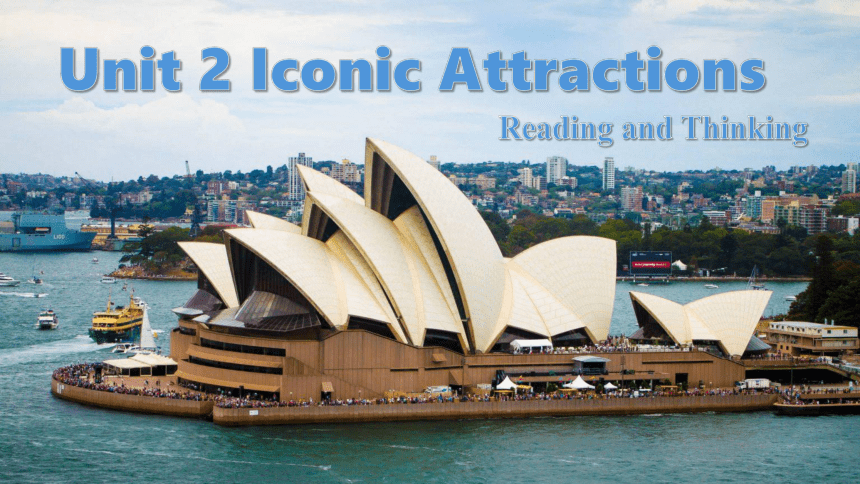 | |
| 格式 | pptx | ||
| 文件大小 | 82.5MB | ||
| 资源类型 | 教案 | ||
| 版本资源 | 人教版(2019) | ||
| 科目 | 英语 | ||
| 更新时间 | 2025-04-01 22:22:14 | ||
图片预览

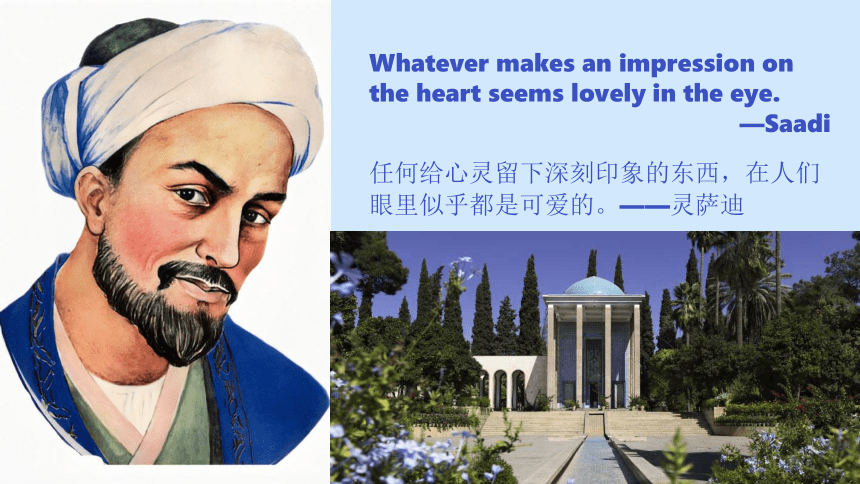
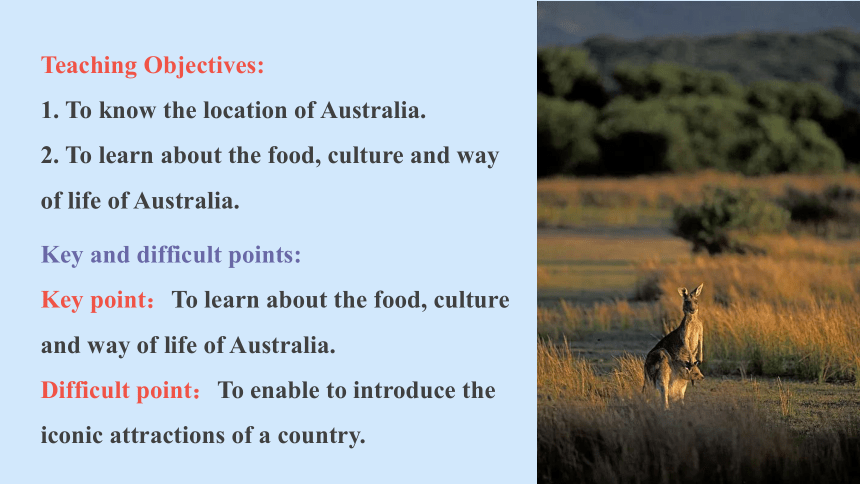


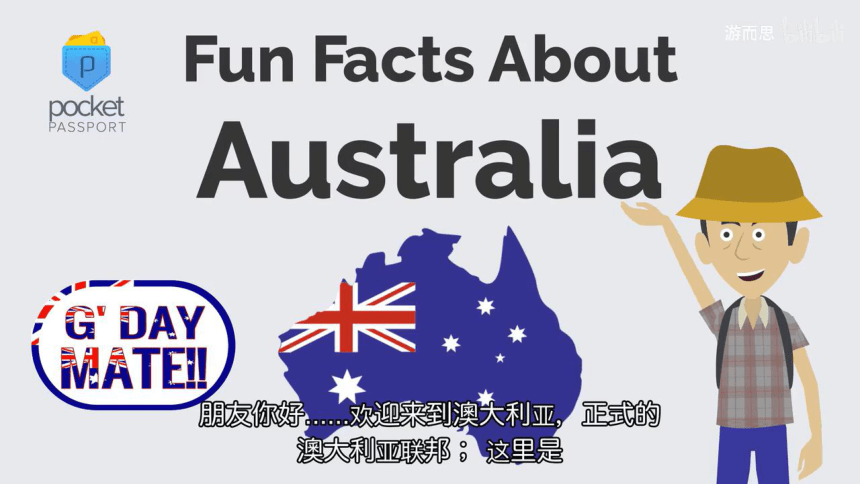

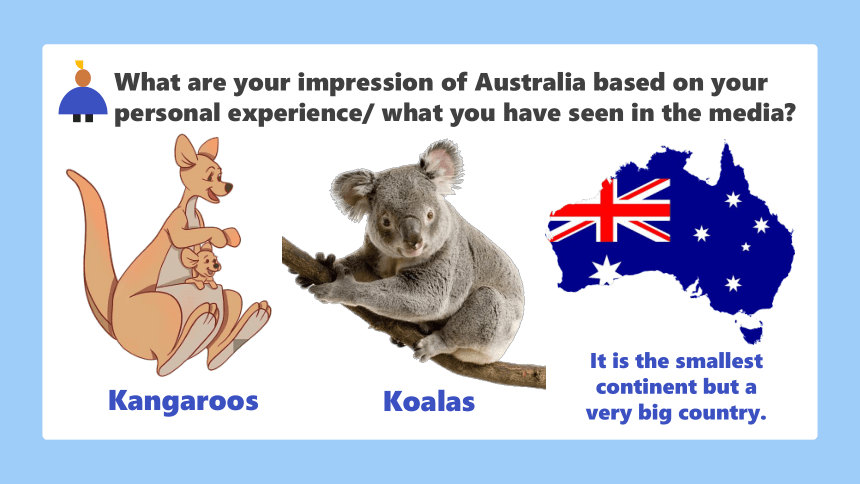

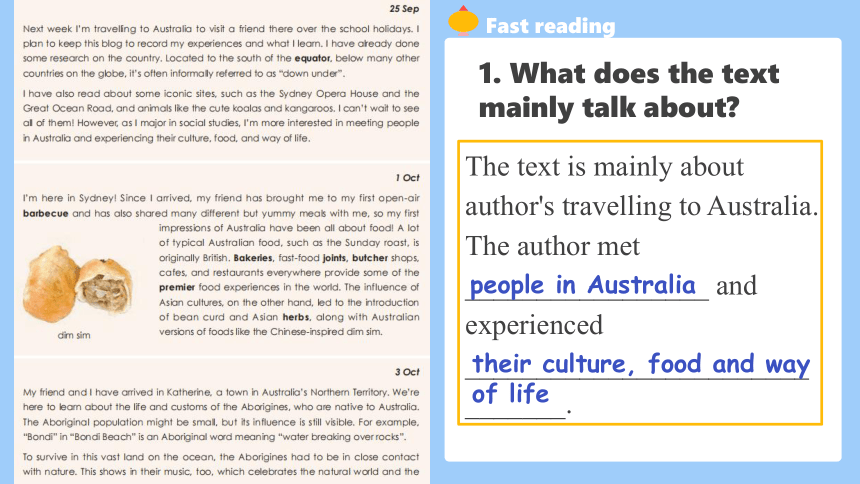
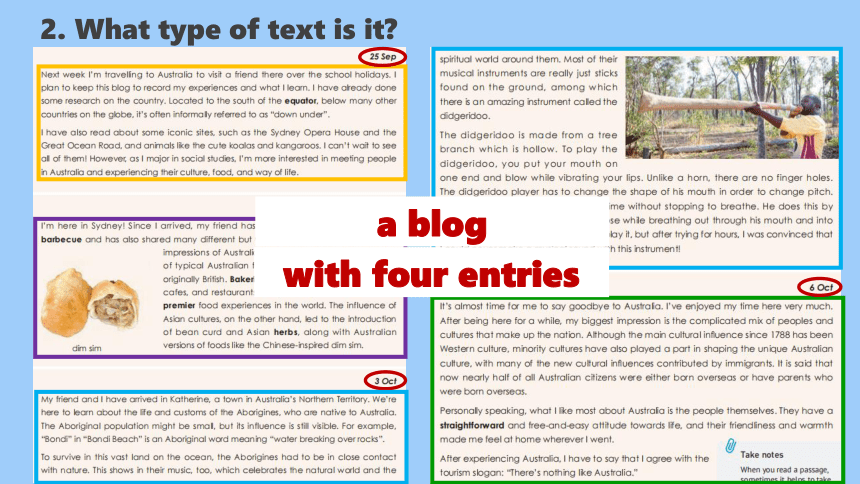
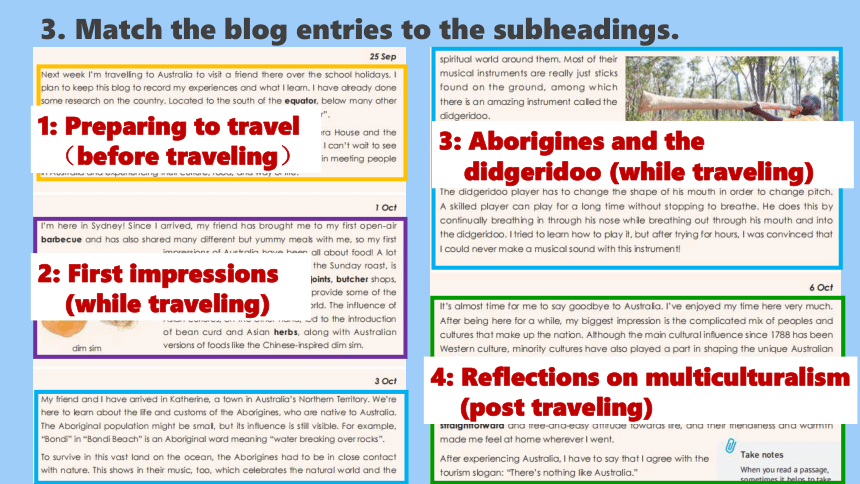
文档简介
(共35张PPT)
Unit 2 Iconic Attractions
Reading and Thinking
Whatever makes an impression on the heart seems lovely in the eye.
—Saadi
任何给心灵留下深刻印象的东西,在人们眼里似乎都是可爱的。——灵萨迪
Teaching Objectives:
1. To know the location of Australia.
2. To learn about the food, culture and way of life of Australia.
Key and difficult points:
Key point:To learn about the food, culture and way of life of Australia.
Difficult point:To enable to introduce the iconic attractions of a country.
Part 1 Lead-in
What does "Iconic Attractions" mean?
"Iconic Attractions" refers to attractions which act as a sign or symbol of someplace.
That is Sydney Opera House.
It is an iconic attraction of Australia.
Part 2
Pre-reading
What are your impression of Australia based on your personal experience/ what you have seen in the media
Kangaroos
Koalas
It is the smallest continent but a very big country.
Part 2
While-reading
Fast reading
1. What does the text mainly talk about
The text is mainly about author's travelling to Australia. The author met _________________ and experienced _______________________________.
people in Australia
their culture, food and way of life
2. What type of text is it
a blog
with four entries
3. Match the blog entries to the subheadings.
1: Preparing to travel
(before traveling)
2: First impressions
(while traveling)
3: Aborigines and the didgeridoo (while traveling)
4: Reflections on multiculturalism
(post traveling)
Fast reading
1.What will interest the author most in Australia
A. Visiting Australian schools.
B. Seeing iconic attractions.
C. Watching cute animals.
D. Meeting local people.
Fast reading
2.What are the author’s first impressions of Australia about
A. Varieties of food.
B. Famous buildings.
C. Different restaurants.
D. Diverse cultures.
Fast reading
3.Which of the following happened on 3 October
A. Being brought to my first open-air barbecue.
B. Reading about some iconic sites.
C. Sharing many different but yummy meals with my friend.
D. Learning how to play the didgeridoo.
Read the blog with four entries carefully.
Blog 1:Preparing to travel
Location, iconic sites, animals.
1. By preparing to travel to Australia, what information has the writer got
2. What is the writer interested in and why
She was more interested in meeting people in Australia and experiencing their culture, food and way of life. Because she majored in social studies.
AUS = down under
N
equator
S
many countries
Location of Aus
iconic sites & animals
Located to the south of the equator, below many other countries, referred to as “down under”.
SOH (Sydney Opera House)
GOR (Great Ocean Road)
koalas & kangaroos
Take notes
Interests
meeting people
experiencing culture, food & way of life
∴ major in social studies
Take notes
How to take notes
1. When you read a passage, sometimes it helps to take notes so that you can better remember and understand what you have learnt.
2. When you take notes, it is good to write down the important facts just using key words and ignore many of the small words.
3. You can also use abbreviations, such as “Aus” for “Australia” and “N” for “north”, and use symbols such as “&” for “and”.
Take notes
Take notes
Abbreviation pare
c. about / approximately
imp. important / importance
tho though
e.g. example
info information
Symbol ∴ therefore
∵ because
≠ differs from, is the opposite of
= is/are/have/has/
equals
∧ but
& and
Blog 2:First impressions
First impressions
(Sydney)
1st open-air BBQ
1
2
3
4
5
Food
dif ∧ yummy meals
typical Au food Bri
e.g. Sunday roast
premier food expces
Asian cultures
bean curd & herbs
Au version dim sim
Experiences
Learn
Blog 3:Aborigines and the didgeridoo
1. small population
visible influence
2. history: hard survive, close contact with nature
music
instru: sticks
theme: celebrate natural &spiritual world
the didgerigoo: hollow branch
put, blow…vibrating…, hole→change mouth shape →pitch, breathe in …nose, out…mouth
Name
Usage
Aborigines
(Katherine, N. Territory)
Blog 4:Reflections on multiculturalism
mix of people (50% born overseas)
mix of cultures (Western + minority + immigrant)
facts
feelings
like the people most
Reasons
straightforward
free & easy attitude to life
friendliness, warmth
There is nothing like Australia.
unique people
unique Aus culture
Make a summary of the blog entries.
01
Location Landmarks
Unique animals
Real interests
Preparation
02
open-air BBQ
typical Aus food
Herbs, Aus version dim sim
Food
03
Aboriginals: be close to nature
the didgeridoo: a musical instrument
Natives
04
There is nothing like Australia.
Multiculturalism
The mix of peoples and cultures.
Their personalities
Use your notes to answer the following questions.
Australia.
1. What does “down under” mean
2. How has Australian cuisine been influenced by different cultures Give two examples.
A lot of typical Australian food, such as the Sunday roast, is originaly British. The influence of Asian cultures, on the other hand, led to the introduction of bean curd and Asian herbs, along with Australian versions of foods like the Chinese-inspired dim sim.
It celebrates the natural world and the spiritual world around them, because to survive in the vast land, the Aborigines had to be in close contact with nature.
3. What is the main theme reflected in Aboriginal music and why
4. What are the writer's first and biggest impressions of Australia Why
Her first impressions of Australia have been all about food, because her friend shared many different but yummy meals with her. Her biggest impression is the complicated mix of peoples and cultures that make up the nation. She feels this perhaps because of the many different kinds of people she met.
Part 3
Post-reading
Work in groups. Discuss what iconic Chinese attractions you would like to introduce to a foreigner and explain why.
The Palace Museum
Archaeological Value: The Terracotta Warriors are part of the Emperor Qinshihuang's Mausoleum Site Park and one of the most important archaeological discoveries in China. They are hailed as the "Eighth Wonder of the World". As physical evidence of the Qin Dynasty, they provide precious first-hand materials for studying various aspects of the Qin Dynasty, such as its military, politics, economy, and culture.
Work in groups. Discuss what iconic Chinese attractions you would like to introduce to a foreigner and explain why.
The Great Wall
Historical and Cultural Value: The Great Wall was first constructed during the Spring and Autumn and Warring States periods. It has witnessed the construction and development of ancient Chinese border defense lines and serves as an important witness to Chinese history.
Symbolic Significance: The Great Wall is a representative symbol of the Chinese nation and an important symbol of Chinese civilization. It embodies the unremitting struggle spirit of the Chinese nation and the patriotic feelings of unity and tenacity.
Work in groups. Discuss what iconic Chinese attractions you would like to introduce to a foreigner and explain why.
The Li River in Guilin
Unique Natural Landscape: Guilin's landscape is renowned as the best under heaven, and the Li River is the essence of Guilin's scenery. The river is as clear as a mirror, and the peaks on both sides are unique and various in shape.
Profound Cultural Heritage: There are rich folk cultures and historical legends around the Li River, such as the story of Liu Sanjie. These cultural elements add a strong humanistic atmosphere to the Li River, enabling foreign tourists to understand Chinese folk culture and traditional stories while enjoying the beautiful scenery.
Part 4
Language Points
Vocabulary
major in
majority n.多数;大半
be in the/a majority占大多数
a small/narrow majority 微弱优势
a great/huge/large majority 绝大多数
主修
Susan majors in British literature at university and she wants to write science fiction.
苏珊在大学主修英国文学,她想写科幻小说。
minority n.少数民族,少数派;少数
a minority of 少数......
be in a/the minority 占少数
Vocabulary
make up
make up one's mind 下决心;决定
makeup for 弥补,补偿
make out 看出,听出;理解;辨认出
make for 朝……行进;对……有好处;有助于
组成,构成;化妆;编造(故事、谎言等);和好;占据
In some languages, 100 words make up half of all words used in daily conversations.
在一些语言中,100 个单词占日常会话中所有单词的一半。
Vocabulary
foundation
without foundation = have no foundation 无根据/虚构
n.(机构、组织等的)创建;基础;地基
The rumour is totally without foundation.
=The rumour totally has no foundation. 这谣传毫无根据。
The organization has grown enormously since its foundation in 1955
该组织自 1955 年创建以来已有重大的发展。
I told my niece that she should lay good foundation for her future studies.
我告诉我的侄女她应该为自己的未来学习打好坚实的基础。
SEE YOU NEXT TIME
Unit 2 Iconic Attractions
Reading and Thinking
Whatever makes an impression on the heart seems lovely in the eye.
—Saadi
任何给心灵留下深刻印象的东西,在人们眼里似乎都是可爱的。——灵萨迪
Teaching Objectives:
1. To know the location of Australia.
2. To learn about the food, culture and way of life of Australia.
Key and difficult points:
Key point:To learn about the food, culture and way of life of Australia.
Difficult point:To enable to introduce the iconic attractions of a country.
Part 1 Lead-in
What does "Iconic Attractions" mean?
"Iconic Attractions" refers to attractions which act as a sign or symbol of someplace.
That is Sydney Opera House.
It is an iconic attraction of Australia.
Part 2
Pre-reading
What are your impression of Australia based on your personal experience/ what you have seen in the media
Kangaroos
Koalas
It is the smallest continent but a very big country.
Part 2
While-reading
Fast reading
1. What does the text mainly talk about
The text is mainly about author's travelling to Australia. The author met _________________ and experienced _______________________________.
people in Australia
their culture, food and way of life
2. What type of text is it
a blog
with four entries
3. Match the blog entries to the subheadings.
1: Preparing to travel
(before traveling)
2: First impressions
(while traveling)
3: Aborigines and the didgeridoo (while traveling)
4: Reflections on multiculturalism
(post traveling)
Fast reading
1.What will interest the author most in Australia
A. Visiting Australian schools.
B. Seeing iconic attractions.
C. Watching cute animals.
D. Meeting local people.
Fast reading
2.What are the author’s first impressions of Australia about
A. Varieties of food.
B. Famous buildings.
C. Different restaurants.
D. Diverse cultures.
Fast reading
3.Which of the following happened on 3 October
A. Being brought to my first open-air barbecue.
B. Reading about some iconic sites.
C. Sharing many different but yummy meals with my friend.
D. Learning how to play the didgeridoo.
Read the blog with four entries carefully.
Blog 1:Preparing to travel
Location, iconic sites, animals.
1. By preparing to travel to Australia, what information has the writer got
2. What is the writer interested in and why
She was more interested in meeting people in Australia and experiencing their culture, food and way of life. Because she majored in social studies.
AUS = down under
N
equator
S
many countries
Location of Aus
iconic sites & animals
Located to the south of the equator, below many other countries, referred to as “down under”.
SOH (Sydney Opera House)
GOR (Great Ocean Road)
koalas & kangaroos
Take notes
Interests
meeting people
experiencing culture, food & way of life
∴ major in social studies
Take notes
How to take notes
1. When you read a passage, sometimes it helps to take notes so that you can better remember and understand what you have learnt.
2. When you take notes, it is good to write down the important facts just using key words and ignore many of the small words.
3. You can also use abbreviations, such as “Aus” for “Australia” and “N” for “north”, and use symbols such as “&” for “and”.
Take notes
Take notes
Abbreviation pare
c. about / approximately
imp. important / importance
tho though
e.g. example
info information
Symbol ∴ therefore
∵ because
≠ differs from, is the opposite of
= is/are/have/has/
equals
∧ but
& and
Blog 2:First impressions
First impressions
(Sydney)
1st open-air BBQ
1
2
3
4
5
Food
dif ∧ yummy meals
typical Au food Bri
e.g. Sunday roast
premier food expces
Asian cultures
bean curd & herbs
Au version dim sim
Experiences
Learn
Blog 3:Aborigines and the didgeridoo
1. small population
visible influence
2. history: hard survive, close contact with nature
music
instru: sticks
theme: celebrate natural &spiritual world
the didgerigoo: hollow branch
put, blow…vibrating…, hole→change mouth shape →pitch, breathe in …nose, out…mouth
Name
Usage
Aborigines
(Katherine, N. Territory)
Blog 4:Reflections on multiculturalism
mix of people (50% born overseas)
mix of cultures (Western + minority + immigrant)
facts
feelings
like the people most
Reasons
straightforward
free & easy attitude to life
friendliness, warmth
There is nothing like Australia.
unique people
unique Aus culture
Make a summary of the blog entries.
01
Location Landmarks
Unique animals
Real interests
Preparation
02
open-air BBQ
typical Aus food
Herbs, Aus version dim sim
Food
03
Aboriginals: be close to nature
the didgeridoo: a musical instrument
Natives
04
There is nothing like Australia.
Multiculturalism
The mix of peoples and cultures.
Their personalities
Use your notes to answer the following questions.
Australia.
1. What does “down under” mean
2. How has Australian cuisine been influenced by different cultures Give two examples.
A lot of typical Australian food, such as the Sunday roast, is originaly British. The influence of Asian cultures, on the other hand, led to the introduction of bean curd and Asian herbs, along with Australian versions of foods like the Chinese-inspired dim sim.
It celebrates the natural world and the spiritual world around them, because to survive in the vast land, the Aborigines had to be in close contact with nature.
3. What is the main theme reflected in Aboriginal music and why
4. What are the writer's first and biggest impressions of Australia Why
Her first impressions of Australia have been all about food, because her friend shared many different but yummy meals with her. Her biggest impression is the complicated mix of peoples and cultures that make up the nation. She feels this perhaps because of the many different kinds of people she met.
Part 3
Post-reading
Work in groups. Discuss what iconic Chinese attractions you would like to introduce to a foreigner and explain why.
The Palace Museum
Archaeological Value: The Terracotta Warriors are part of the Emperor Qinshihuang's Mausoleum Site Park and one of the most important archaeological discoveries in China. They are hailed as the "Eighth Wonder of the World". As physical evidence of the Qin Dynasty, they provide precious first-hand materials for studying various aspects of the Qin Dynasty, such as its military, politics, economy, and culture.
Work in groups. Discuss what iconic Chinese attractions you would like to introduce to a foreigner and explain why.
The Great Wall
Historical and Cultural Value: The Great Wall was first constructed during the Spring and Autumn and Warring States periods. It has witnessed the construction and development of ancient Chinese border defense lines and serves as an important witness to Chinese history.
Symbolic Significance: The Great Wall is a representative symbol of the Chinese nation and an important symbol of Chinese civilization. It embodies the unremitting struggle spirit of the Chinese nation and the patriotic feelings of unity and tenacity.
Work in groups. Discuss what iconic Chinese attractions you would like to introduce to a foreigner and explain why.
The Li River in Guilin
Unique Natural Landscape: Guilin's landscape is renowned as the best under heaven, and the Li River is the essence of Guilin's scenery. The river is as clear as a mirror, and the peaks on both sides are unique and various in shape.
Profound Cultural Heritage: There are rich folk cultures and historical legends around the Li River, such as the story of Liu Sanjie. These cultural elements add a strong humanistic atmosphere to the Li River, enabling foreign tourists to understand Chinese folk culture and traditional stories while enjoying the beautiful scenery.
Part 4
Language Points
Vocabulary
major in
majority n.多数;大半
be in the/a majority占大多数
a small/narrow majority 微弱优势
a great/huge/large majority 绝大多数
主修
Susan majors in British literature at university and she wants to write science fiction.
苏珊在大学主修英国文学,她想写科幻小说。
minority n.少数民族,少数派;少数
a minority of 少数......
be in a/the minority 占少数
Vocabulary
make up
make up one's mind 下决心;决定
makeup for 弥补,补偿
make out 看出,听出;理解;辨认出
make for 朝……行进;对……有好处;有助于
组成,构成;化妆;编造(故事、谎言等);和好;占据
In some languages, 100 words make up half of all words used in daily conversations.
在一些语言中,100 个单词占日常会话中所有单词的一半。
Vocabulary
foundation
without foundation = have no foundation 无根据/虚构
n.(机构、组织等的)创建;基础;地基
The rumour is totally without foundation.
=The rumour totally has no foundation. 这谣传毫无根据。
The organization has grown enormously since its foundation in 1955
该组织自 1955 年创建以来已有重大的发展。
I told my niece that she should lay good foundation for her future studies.
我告诉我的侄女她应该为自己的未来学习打好坚实的基础。
SEE YOU NEXT TIME
